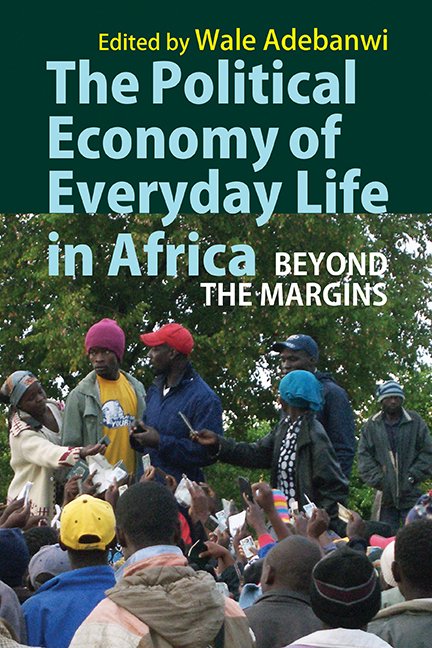Book contents
- Frontmatter
- Dedication
- Contents
- Maps, Illustrations & Tables
- Notes on Contributors
- Foreword
- Acknowledgements
- Approaching the Political Economy of Everyday Life An Introduction
- Part I MONEY MATTERS: CURRENCY & FISCAL LIFE STRUGGLES
- Part II LABOUR, SOCIAL LIVES & PRECARITY
- 5 From Enslavement to Precarity? The Labour Question in African History
- 6 Navigating Formality in a Migrant Labour Force
- Part III MARGINALITY, DISAFFECTION & BIO-ECONOMIC DISTRESS
- Part IV HISTORICITY, TEMPORALITY, AGENCY & DEMOCRATIC LIFE
- Afterword: The Landscapes Beyond the Margins Agency, Optimization & the Power of the Empirical
- Index
6 - Navigating Formality in a Migrant Labour Force
from Part II - LABOUR, SOCIAL LIVES & PRECARITY
Published online by Cambridge University Press: 31 August 2018
- Frontmatter
- Dedication
- Contents
- Maps, Illustrations & Tables
- Notes on Contributors
- Foreword
- Acknowledgements
- Approaching the Political Economy of Everyday Life An Introduction
- Part I MONEY MATTERS: CURRENCY & FISCAL LIFE STRUGGLES
- Part II LABOUR, SOCIAL LIVES & PRECARITY
- 5 From Enslavement to Precarity? The Labour Question in African History
- 6 Navigating Formality in a Migrant Labour Force
- Part III MARGINALITY, DISAFFECTION & BIO-ECONOMIC DISTRESS
- Part IV HISTORICITY, TEMPORALITY, AGENCY & DEMOCRATIC LIFE
- Afterword: The Landscapes Beyond the Margins Agency, Optimization & the Power of the Empirical
- Index
Summary
Introduction
Stack after stack of pallets, each piled high with crates of oranges, await the trucks that will take them from the farm of Grootplaas, located on South Africa's border with Zimbabwe, to the port of Durban on South Africa's Indian Ocean coast. From there, ships will take them to countries across Europe, the Middle East and East Asia. Different crate designs signal different agents, buyers and brands. The logos of British supermarkets and American citrus providers (even though South African oranges reportedly cannot be sold in the United States) jostle with those of Capespan fruit agents and the local Limpopo Valley trade name. Michael, Grootplaas's personnel manager and packshed administrator, moves between the pallets, dressed in a white coat and armed with a clipboard. Key to his role is producing the labels that detail each pallet's journey. As they sit next to the loading bay, the pallets of oranges evoke industrial-scale production, global connections, and the clinical formality of factories in the fields. Certainly, this is a long way from the old stereotypes of South African farms as quasi-feudal, anachronistic backwaters.
At the very centre of the packshed's network of conveyor belts, and the gantries overlooking them, is Michael's harvest-time office. Visible to all, it is a statement about the importance of paperwork in the work of the farm. Alongside the export labels and documents lie Grootplaas's personnel records, for which Michael is also responsible as personnel manager. These follow Michael in a bank of filing cabinets, as his work moves seasonally between the packshed and the farm's workshop. The contents tell one version of work and life on the border farms. Applications for employment, contracts, South African documents for ‘normalization’ (regularization), and records of dismissal all speak in a corporate register – ‘thank you for your interest in our company’, the application for employment declares. But, among these documents, Zimbabwean departure permits signed by thumbprint speak of another reality – of migrant workers fleeing the estate, even without their official identification.
Working on the border farms involves constantly relating to official and semi-official documents and institutionalized arrangements. This is doubtless what we expect of formal employment.
- Type
- Chapter
- Information
- The Political Economy of Everyday Life in AfricaBeyond the Margins, pp. 157 - 176Publisher: Boydell & BrewerPrint publication year: 2017



